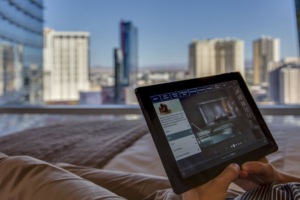
In the ever-evolving world of hospitality, hotels are constantly seeking innovative ways to improve their services and exceed guest expectations. As technology continues to advance, it plays a pivotal role in transforming the guest experience, streamlining operations, and elevating overall satisfaction. In this blog post, we will explore some of the best new technologies for hotels that have emerged in recent years. From cutting-edge check-in methods to personalized guest amenities, these technologies are reshaping the way hotels operate and cater to their guests.
Contactless Check-In and Check-Out
One of the most significant technological advancements in the hotel industry is the adoption of contactless check-in and check-out systems. Mobile apps and self-service kiosks have made the traditional front desk experience a thing of the past. Guests can now check in using their smartphones, receive their digital room key, and even control room amenities like temperature and lighting through integrated apps. This streamlined process not only reduces waiting times but also allows guests to have a seamless and more personalized experience from the moment they arrive until they leave.
Smart Room Technology
The concept of a “smart” hotel room is revolutionizing the hospitality industry. These rooms are equipped with IoT (Internet of Things) devices that allow guests to control various room functions using their smartphones or voice commands. From adjusting the blinds to ordering room service, smart rooms provide a high level of convenience and personalization. Additionally, smart rooms often include features like occupancy sensors that help hotels optimize energy consumption and enhance guest safety.
Artificial Intelligence (AI) and Virtual Assistants
AI-powered virtual assistants are becoming increasingly prevalent in hotels. These intelligent systems can handle guest inquiries, provide information about hotel services, and even offer personalized recommendations for local attractions and dining options. By leveraging AI technology, hotels can offer 24/7 support, enhance guest engagement, and tailor the guest experience to individual preferences.
Personalized Guest Experience
Big data analytics such as IA-2660-E and AI algorithms have given rise to a new level of personalization in the hotel industry. Hotels can now analyze guest data to understand their preferences, such as room temperature, preferred amenities, or dining choices. Armed with this information, hotels can customize the guest experience, offering tailored promotions, room setups, and amenities, making guests feel valued and appreciated.
Augmented Reality (AR) and Virtual Reality (VR)
AR and VR technologies are not limited to gaming and entertainment; they are also making waves in the hospitality industry. Hotels are using these immersive technologies to showcase their properties virtually, allowing potential guests to experience the ambiance and amenities before booking. VR can also be used to create unique in-room experiences, offering virtual tours of exotic destinations or providing guests with relaxing VR environments.
Enhanced Guest Services through Chatbots
Chatbots are transforming the way hotels handle customer service. Integrated into hotel websites and mobile apps, chatbots offer immediate assistance to guests, answering their queries, helping with reservations, and resolving issues promptly. By automating routine tasks, hotels can free up staff to focus on more complex guest needs, improving overall efficiency and guest satisfaction.
Internet of Things (IoT) for Efficiency and Sustainability
IoT technology is being employed by hotels to optimize energy consumption, enhance security, and streamline operations. Sensors and devices can monitor and control lighting, heating, and air conditioning based on occupancy, ensuring energy is not wasted in unoccupied rooms. IoT also enables predictive maintenance for hotel equipment, reducing downtime and minimizing disruptions for guests.
Robotic Assistance
Robotics is making its mark in the hotel industry, particularly in housekeeping and room service. Robots can efficiently clean rooms, deliver amenities, and handle minor guest requests, providing consistent and timely services. Though not a complete replacement for human staff, robots can complement existing resources and create a memorable experience for guests.
Conclusion
As the hotel industry continues to evolve, technology plays a crucial role in transforming guest experiences, optimizing operations, and staying ahead of the competition. From contactless check-in to AI-powered virtual assistants, the best new technologies for hotels are centered around personalization, convenience, and sustainability. Embracing these advancements will not only enhance guest satisfaction but also position hotels at the forefront of the digital age.
By adopting these cutting-edge technologies, hotels can create unforgettable experiences for guests, turning them into loyal customers who will eagerly return for the seamless blend of luxury and innovation. As technology continues to evolve, the hotel industry will undoubtedly see even more exciting developments, further revolutionizing the way guests interact with and enjoy their stays.